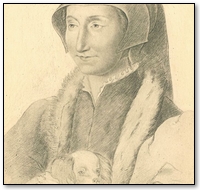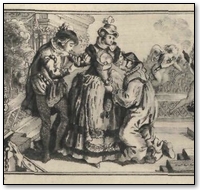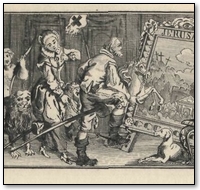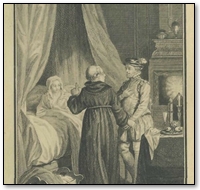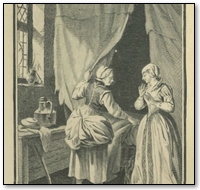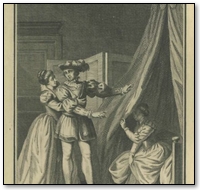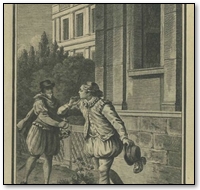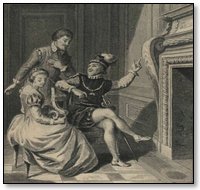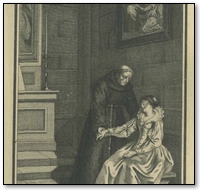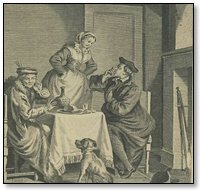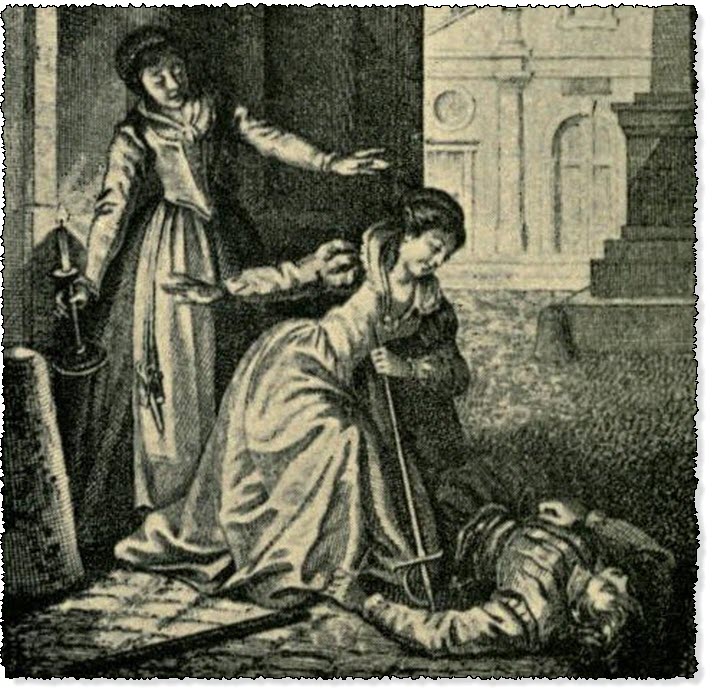
The Gentleman on The Death of his Mistress
The Heptameron - Day 7 - Tale 50 - The Gentleman on The Death of his Mistress
Summary of the Tenth Tale Told on the Fifth of the Heptameron
Tale 50 of the Heptameron
In the Duchy of Burgundy there was a Duke who was a very honourable and handsome Prince. He had married a wife whose beauty pleased him so greatly that it kept him from knowledge of her character, and he took thought only how he might please her, whilst she made excellent show of returning his affection. Now the Duke had in his household a gentleman filled with all the perfection that could be sought for in a man. He was loved by all, more especially by the Duke, who had reared him from childhood near his own person; and, finding him possessed of such excellent qualities, the Duke loved him exceedingly and trusted him with all such matters as one of his years could understand.
The Duchess, who had not the heart of a virtuous woman and Princess, and was not content with the love that her husband bore her and the good treatment that she had at his hands, often observed this gentleman, and so much to her liking did she find him, that she loved him beyond measure. This she strove unceasingly to make known to him, as well by soft and piteous glances as by sighs and passionate looks.
But the gentleman, whose inclinations had ever been to virtue alone, could not perceive wickedness in a lady who had so little excuse for it, and so the glances and looks of the poor wanton bore no fruit save her own frenzied despair. This at last drove her to extremes, and forgetting that she was a woman fit to be entreated and yet to refuse, and a Princess made to be worshipped by such lovers and yet to hold them in scorn, she acted with the spirit of a man transported by passion, with a view to rid herself of the fire which she could no longer endure.
Accordingly, one day when her husband was gone to the council, at which the gentleman by reason of his youth was not present, she beckoned him to come to her, which he did, thinking that she had some command to give him. But leaning on his arm, like a woman wearied with repose, she brought him to walk in a gallery, where she said to him—
"I marvel that you who are so handsome and young, and full of excellent grace, have lived in this company, where are so many beautiful ladies, and yet have been lover or true knight to none." Then, looking at him as graciously as she was able, she waited for his reply.
"Madam," he said, "if I were worthy that your Highness should stoop to think of me, you would have still greater reason to marvel at seeing a man so little worthy of love as I am, offer his service where it would be rejected or scorned."
On hearing this discreet reply, the Duchess felt she loved him more than before. She vowed to him that there was not a lady at her Court who would not be only too happy to have such a knight, and that he might well make an adventure of the sort, since there was no danger but he would come out of it with honour. The gentleman kept his eyes downcast, not daring to meet her looks, which were hot enough to melt ice; but, just as he was trying to excuse himself, the Duke sent for the Duchess to come to the council on some matter that concerned her, and thither with much regret she went. The gentleman never afterwards made the slightest sign of having understood a word of what she had said to him, at which she was exceedingly distressed and vexed; and she knew not to what cause to impute her failure, unless it were to the foolish fear of which she deemed the gentleman to be possessed.
A few days afterwards, finding that he gave no sign of understanding what she had said, she resolved on her part to set aside all fear or shame, and to tell him of her love. She felt sure that beauty such as hers could not be otherwise than well received, although she would fain have had the honour of being wooed. However, she set her honour on one side for her pleasure's sake, and after she had several times attempted the same fashion of discourse as at first, but without receiving any reply to her liking, she one day plucked the gentleman by the sleeve, and told him that she must speak to him on certain matters of weight. The gentleman went with the humility and reverence that were her due to a deep window into which she had withdrawn; and, on perceiving that no one in the room could see her, she began in a trembling voice, that halted between desire and fear, to continue her former discourse, rebuking him for not yet having chosen some lady in the company, and promising him that, no matter who it might be, she would help him to win kindly treatment.
The gentleman, who was no less vexed than astonished by her words, replied—
"Madam, my heart is so tender, that, were I once refused, I should never again have joy in this world; and I know myself to be of such little worth that no lady at this Court would deign to accept my suit."
The Duchess blushed, and, imagining that at last he was indeed won, vowed to him that she knew the most beautiful lady in the company would, if he were willing, joyfully receive him, and afford him perfect happiness.
"Alas! madam," he replied, "I do not think that there is any woman in this company so unfortunate and so blind as to find me worthy of her love."
The Duchess, finding that he would not understand her, drew the veil of her passion somewhat aside, and, by reason of the fears which the gentleman's virtue caused her, spoke to him in the form of a question.
"If fortune," she said, "had so far favoured you that it was myself who bore you this goodwill, what would you say?"
The gentleman, who thought that he was dreaming when he heard her speak in this wise, dropped on his knee, and replied—
"Madam, when God by His favour enables me to have both the favour of the Duke, my master, and your own, I shall deem myself the happiest man alive; for 'tis the reward I crave for the loyal service of one who, more than any other, is bound to give his life in the service of you both. And I am sure, madam, that the love you bear my Lord aforesaid is attended with such chastity and nobleness that, apart from myself, who am but a worm of the earth, not even the greatest Prince and most perfect man to be found could break the union that exists between you. For my own part, my Lord has brought me up from childhood, and made me what I am, and to save my life I could not entertain towards any wife, daughter, sister or mother of his any thought contrary to what is due from a loyal and faithful servant."
The Duchess would not allow him to continue, but finding that she was in danger of obtaining a dishonourable refusal, she suddenly interrupted him, and said—
"Wicked and boastful fool, who seeks any such thing from you? Do you think that your good looks win you the love of the very flies in the air? Nay, if you were presumptuous enough to address yourself to me, I would show you that I love, and seek to love, none but my husband. What I have said to you was spoken only for my amusement, to try you and laugh at you, as I do at all foolish lovers."
"Madam," said the gentleman, "I believed, and do still believe, that it is as you say."
Then, without listening further, she withdrew in haste to her own apartment, and, finding that she was followed by her ladies, went into her closet, where she sorrowed after a fashion that cannot be described. On the one part, the love wherein she had failed caused her mortal sadness; on the other, her anger, both against herself for having entered upon such foolish talk and against the gentleman for his discreet reply, drove her into such fury that at one moment she wished to make away with herself, and at another, to live that she might avenge herself on one whom she now regarded as her deadly enemy.
When she had wept for a long while, she made pretence of being ill, in order that she might not be present at the Duke's supper, at which the gentleman was commonly in waiting. The Duke, who loved his wife better than he did himself, came to see her; but the more effectually to work her end, she told him that she believed herself to be with child, and that her pregnancy had caused a rheum to come upon her eyes, which gave her much pain. So passed two or three days, during which the Duchess kept her bed in sadness and melancholy, until at last the Duke thought that something further must be the matter. He therefore came at night to sleep with her; but, finding that for all he could do he could in no sort check her sighs, he said to her—
"You know, sweetheart, that I love you as dearly as my life, and that if yours were lacking I could not endure my own. If therefore you would preserve my health, I pray you tell me what causes you to sigh after this manner; for I cannot believe that such unhappiness can come only because you are with child."
The Duchess, finding that her husband was disposed to her just as she could have wished him to be, thought that the time was come to seek vengeance for her affliction; and embracing the Duke, she began to weep, and said—
"Alas, my lord, my greatest unhappiness is to see you deceived by those on whom is so deep an obligation to guard your substance and your honour."
The Duke, on hearing this, was very desirous of knowing why she spoke in that manner, and earnestly begged her to make the truth known to him without fear. After refusing several times, she said—
"I shall never wonder, my lord, that foreigners make war on Princes, when those who are in duty most bound to them, wage upon them a war so cruel that loss of territory were nothing in comparison. I say this, my lord, in reference to a certain gentleman" (naming her enemy) "who, though reared by your own hand and treated more like a son than a servant, has made a cruel and base attempt to ruin the honour of your wife, in which is also bound up the honour of your house and your children. Although for a long time he showed me such looks as pointed to his wicked purpose, yet my heart, which only cares for you, understood nothing of them; and so at last he declared himself in words to which I returned a reply such as beseemed my condition and my chastity. Nevertheless, I now so hate him that I cannot endure to look at him, and for this cause I have continued in my own apartment and lost the happiness of fellowship with you. I entreat you, my lord, keep not this pestilence near your person; for, after such a crime, he might fear lest I should tell you of it, and so attempt worse. This, my lord, is the cause of my sorrow, and methinks it were right and fitting that you should deal with it forthwith."
The Duke, who on the one hand loved his wife and felt himself grievously affronted, and on the other loved his servant, whose faithfulness he had so fully tried that he could scarce believe this falsehood against him, was in great distress and filled with anger. Repairing to his own room, he sent word to the gentleman to come no more into his presence, but to withdraw to his lodging for a time. The gentleman, being ignorant of the cause of this, was grieved exceedingly, for he knew that he had deserved the opposite of such unworthy treatment. Aware, then, of his own innocence in heart and deed, he sent a comrade to speak to the Duke and take him a letter, humbly entreating that if any evil report had caused his banishment, his master would be pleased to suspend judgment until he had heard from himself the truth of the matter, when it would be found that he had been guilty of no offence.
When the Duke saw this letter, his anger was somewhat abated. He secretly sent for the gentleman to his own room, and with wrathful countenance said—
"I could never have thought that the care I took to rear you as my own child would be changed into regret at having so highly advanced you; but you have attempted what was more hurtful to me than loss of life or substance, and have sought to assail the honour of one who is half myself, and so bring infamy on my house and name. You may be assured that this outrage is so wounding to my heart that, were it not for my doubt whether it be true or not, you would have already been at the bottom of the water, and so have received in secret due punishment for the wrong that in secret you intended against me."
The gentleman was in no wise dismayed by this discourse, but, ignorant as he was of the truth, spoke forth with confidence and entreated the Duke to name his accuser, since such a charge should be justified rather with the lance than with the tongue.
"Your accuser," said the Duke, "carries no weapon but chastity. Know, then, that none other but my wife has told me this, and she begged me to take vengeance upon you."
The poor gentleman, though he then perceived the lady's great wickedness, would not accuse her.
"My lord," he replied, "my lady may say what she will. You know her better than I do, and you are aware if ever I saw her when out of your sight, save only on one occasion, when she spoke but little with me. You have, moreover, as sound a judgment as any Prince alive; wherefore I pray you, my lord, judge whether you have ever seen aught in me to cause any suspicion; and remember love is a fire that cannot be hidden so as never to be known of by those who have had a like distemper. So I pray you, my lord, to believe two things of me: first, that my loyalty to you is such that were my lady, your wife, the fairest being in the world, love would never avail to make me stain my honour and fidelity; and secondly, that even were she not your wife, I should be least in love with her of all the women I have ever known, since there are many others to whom I would sooner plight my troth."
On hearing these words of truth, the Duke began to be softened, and said—
"I assure you, on my part, that I did not believe it. Do, therefore, according to your wont, in the assurance that, if I find the truth to be on your side, I will love you yet better than before. But if it be not so, your life is in my hands."
The gentleman thanked him and offered to submit to any pain or penalty if he were found guilty.
The Duchess, on seeing the gentleman again in waiting as had formerly been his wont, could not endure it in patience, but said to her husband—
"'Twould be no more than you deserve, my lord, if you were poisoned, since you put more trust in your deadly enemies than in your friends."
"I pray you, sweetheart, do not torment yourself in this matter," said the Duke. "If I find that you have told me true, I promise you he shall not live four and twenty hours. But he has sworn to the contrary, and I have myself never perceived any such fault, and so I cannot believe it without complete proof."
"In good sooth, my lord," she replied, "your goodness renders his wickedness the greater. What more complete proof would you have than this, that no love affair has ever been imputed to him? Believe me, my lord, were it not for the lofty purpose that he took into his head of being my lover, he would not have continued so long without a mistress; for never did a young man live solitary as he does in such good company, unless he had fixed his heart so high as to be content merely with his own vain hope. Since, then, you think that he is not hiding the truth from you, put him, I beg you, on oath as regards his love. If he loves another, I am content that you should believe him, and if not, you will know that what I say is true."
The Duke thought his wife's reasonings very good, and, taking the gentleman into the country with him, said—
"My wife continues still of the same mind, and has set before me an argument that causes me grave suspicion against you. It is deemed strange that you who are so gallant and young have never been known to love, and this makes me think that you have such affection for her as she says, and that the hope it gives you renders you content to think of no other woman. As a friend, therefore, I pray you, and as a master I command you to tell me whether you are in love with any lady on earth."
Although the gentleman would have fain concealed his passion yet as he loved his life, he was obliged, on seeing his master's jealousy, to swear to him that he did indeed love one whose beauty was so great, that the beauty of the Duchess or of any lady of the Court would be simply ugliness beside it. But he entreated that he might never be compelled to name her, since the agreement between himself and his sweetheart was of such a nature that it could not be broken excepting by whichever of them should be the first to make it known.
The Duke promised not to urge him, and being quite satisfied with him, treated him with more kindness than ever before. The Duchess perceived this, and set herself with her wonted craft to find out the reason. The Duke did not hide it from her; whereupon strong jealousy sprang up beside her desire for vengeance, and she begged her husband to command the gentleman to name his sweetheart. She assured him that the story was a lie, and that the course she urged was the best means of testing it. If the gentleman, said she, did not name her whom he deemed so beautiful, and his master believed him on his mere word, he would indeed be the most foolish Prince alive.
The poor Duke, whose wife directed his thoughts at her pleasure, went to walk alone with the gentleman, and told him that he was in even greater trouble than before; for he was greatly minded to believe that he had been given an excuse to keep him from suspecting the truth. This was a greater torment to him than ever; and he therefore begged the gentleman, as earnestly as he was able, to name her whom he loved so dearly. The poor gentleman entreated that he might not be made to commit so great an offence against his mistress as to break the promise he had given her and had kept so long, and thus lose in a day all that he had preserved for seven years. And he added that he would rather suffer death than in this wise wrong one who had been true to him.
The Duke, finding that he would not tell him, became deeply jealous, and with a wrathful countenance exclaimed—
"Well, choose one of two things: either tell me whom you love more than any other, or else go into banishment from the territories over which I rule, under pain of a cruel death if you be found within them after a week is over."
If ever heart of loyal servant was torn with anguish, it was so with that of this poor gentleman, who might well have said, Angustiæ sunt mihi undique, for on the one part he saw that by telling the truth he would lose his mistress, if she learned that he had failed in his promise to her; while, if he did not confess it, he would be banished from the land in which she dwelt, and be no more able to see her. Hard pressed in this manner on all sides, there came upon him a cold sweat, as on one whose sorrow was bringing him near to death. The Duke, observing his looks, concluded that he loved no other lady than the Duchess, and was enduring this suffering because he was able to name none other. He therefore said to him with considerable harshness—
"If what you say were true, you would not have so much trouble in telling me; but methinks 'tis your crime that is tormenting you."
The gentleman, piqued by these words, and impelled by the love that he bore his master, resolved to tell him the truth, believing that he was too honourable a man ever, on any account, to reveal it. Accordingly, throwing himself upon his knees, and clasping his hands, he said—
"My lord, the duty that I owe to you and the love that I bear you constrain me more than the fear of any death. I can see that you imagine and judge falsely concerning me, and, to take this trouble from you, I am resolved to do that to which no torment had compelled me. But I pray you, my lord, swear to me by the honour of God, and promise me by your own faith as a Prince and a Christian, that you will never reveal the secret which, since it so pleases you, I am obliged to tell."
Upon this the Duke swore to him with all the oaths he could think of that he would never reveal aught of it to any living being, whether by speech, or writing, or feature. Then the young man, feeling confidence in so virtuous a Prince as he knew his master to be, began the building up of his misfortune, and said—
"It is now seven years, my lord, since knowing your niece, the Lady du Vergier, to be a widow and without kindred, I set myself to win her favour. But, since I was of too lowly a birth to wed her, I contented myself with being received by her as her true knight, as indeed I have been. And it has pleased God that the affair has hitherto been contrived with much discretion, so that neither man nor woman knows of it save ourselves alone, and now, my lord, you also. I place my life and honour in your hands, entreating you to keep the matter secret and to esteem your niece none the less; for I think that under heaven there is no more perfect being."
If ever man was rejoiced it was the Duke, for, knowing as he did the exceeding beauty of his niece, he now had no doubt that she was more pleasing than his wife. However, being unable to understand how so great a mystery could have been contrived, he begged the gentleman to tell him how it was that he was able to see her. The gentleman related to him then that his lady's chamber looked upon a garden, and that, on the days when he was to visit her, a little gate was left open through which he went in on foot until he heard the barking of a little dog which the lady used to loose in the garden when all her women were withdrawn. Then he went and conversed with her all night long, and, in parting from her, would appoint a day on which he would return; and this appointment, unless for some weighty reason, he never failed to keep. The Duke, who was the most inquisitive man alive, and who had made love in no small degree in his day, wished both to satisfy his suspicions and to fully understand so strange a business; and he therefore begged the gentleman to take him, not as a master but as a companion, the next time he went thither. To this the gentleman, having gone so far already, consented, saying that he had an appointment for that very day; at which the Duke was as glad as if he had gained a kingdom. Making pretence of retiring to rest in his closet, he caused two horses to be brought for himself and the gentleman, and they travelled all night long from Argilly, where the Duke lived, to Le Vergier. (2)
Then they left their horses without the wall, and the gentleman brought the Duke into the garden through the little gate, begging him to remain behind a walnut-tree, whence he might see whether he had been told the truth or not.
They had been but a short time in the garden when the little dog began to bark, and the gentleman walked towards the tower, where his lady failed not to come and meet him. She kissed him, saying that it seemed a thousand years since she had seen him, and then they went into the chamber and shut the door behind them.
Having seen the whole of the mystery, the Duke felt more than satisfied. Nor had he a great while to wait, for the gentleman told his mistress that he must needs return sooner than was his wont, since the Duke was to go hunting at four o'clock, and he durst not fail to attend him.
The lady, who set honour before delight, would not keep him from fulfilling his duty; for what she prized most in their honourable affection was that it was kept secret from all.
So the gentleman departed an hour after midnight, and his lady in cloak and kerchief went with him, yet not so far as she wished, for, fearing lest she should meet the Duke, he obliged her to return. Then he mounted with the Duke and returned to the castle of Argilly, his master unceasingly swearing to him on the way that he would die rather than ever reveal his secret. Moreover, he then put so much trust in the gentleman, and had so much love for him, that no one in his Court stood higher in his favour. The Duchess grew furious at this, but the Duke forbade her ever to speak to him about the gentleman again, saying that he now knew the truth about him and was well pleased, since the lady in question was more worthy of love than herself. These words deeply pierced the heart of the Duchess, and she fell into a sickness that was worse than fever.
The Duke went to see her in order to comfort her, but there was no means of doing this except by telling her the name of this beautiful and dearly loved lady. She pressed him urgently to do this, until at last the Duke went out of the room, saying—
"If you speak to me again after this fashion, we shall part one from the other."
These words increased the sickness of the Duchess, and she pretended that she felt her infant stirring, at which the Duke was so rejoiced that he came and lay beside her. But, just when she saw him most loving towards her, she turned away, and said—
"I pray you, my lord, since you have no love for either wife or child, leave us to die together."
With these words she gave vent to many tears and lamentations, and the Duke was in great fear lest she should lose her child. He therefore took her in his arms and begged her to tell him what she would have, since he possessed nothing that was not also hers.
"Ah, my lord," she replied, weeping, "what hope can I have that you would do a hard thing for me, when you will not do the easiest and most reasonable in the world, which is to name to me the mistress of the wickedest servant you ever had? I thought that you and I had but one heart, one soul, and one flesh. But now I see that you look upon me as a stranger, seeing that your secrets, which should be known to me, are hidden from me as though I were a stranger. Alas! my lord, you have told me many weighty and secret matters, of which you have never known me to speak, you have proved my will to be like to your own, and you cannot doubt but that I am less myself than you. And if you have sworn never to tell the gentleman's secret to another, you will not break your oath in telling it to me, for I am not and cannot be other than yourself. I have you in my heart, I hold you in my arms, I have in my womb a child in whom you live, and yet I may not have your heart as you have mine. The more faithful and true I am to you, the more cruel and stern are you to me, so that a thousand times a day do I long by a sudden death to rid my child of such a father and myself of such a husband. And I hope that this will be ere long, since you set a faithless servant before a wife such as 1 am to you, and before the life of the mother of your child, which will perish because I cannot have of you that which I most desire to know."
So saying, she embraced and kissed her husband, and watered his face with her tears, uttering the while such lamentations and sighs that the good Prince feared to lose wife and child together, and resolved to tell her all the truth of the matter. Nevertheless, he first swore to her that if ever she revealed it to a living being she should die by his own hand; and she agreed to and accepted this punishment. Then the poor, deceived husband told her all that he had seen from beginning to end, and she made show of being well pleased. In her heart she was minded very differently, but through fear of the Duke she concealed her passion as well as she was able.
Now on a certain great feast-day the Duke held his Court, to which he had bidden all the ladies of that country, and among the rest his niece. When the dances began, all did their duty save the Duchess, who, tormented by the sight of her niece's beauty and grace, could neither make merry nor prevent her spleen from being perceived. At last she called all the ladies, and making them scat themselves around her, began to talk of love; and seeing that the Lady du Vergier said nothing, she asked her, with a heart which jealousy was rending—
"And you, fair niece, is it possible that your beauty has found no lover or true knight?"
"Madam," replied the Lady du Vergier, "my beauty has not yet made such a conquest. Since my husband's death I have sought to love none but his children, with whom I deem myself happy."
"Fair niece, fair niece," replied the Duchess, with hateful spleen, "there is no love so secret that it is not known, and no little dog so well broken in and trained that it cannot be heard to bark."
I leave you to imagine, ladies, what sorrow the poor Lady du Vergier felt in her heart on finding a matter, so long concealed, thus made known to her great dishonour. Her honour, which had been so carefully guarded and was now wofully lost, tortured her, but still more so her suspicion that her lover had failed in his promise to her. This she did not think he could have done, unless it were that he loved some lady fairer than herself, to whom his love had constrained him to make the whole matter known. Yet so great was her discretion that she gave no sign, but replied laughing to the Duchess that she did not understand the language of animals. However, beneath this prudent concealment her heart was filled with sadness, so that she rose up, and, passing out of the chamber, entered a closet in sight of the Duke, who was walking up and down.
Having thus reached a place where she believed herself to be alone, the poor lady let herself fall helplessly upon a bed, whereat a damsel, who had sat down beside it to sleep, rose up and drew back the curtains to see who this might be. Finding that it was the Lady du Vergier, who believed herself to be alone, she durst say nothing to her, but listened, making as little noise as she was able. And in a stifled voice the poor Lady du Vergier began to lament, saying—
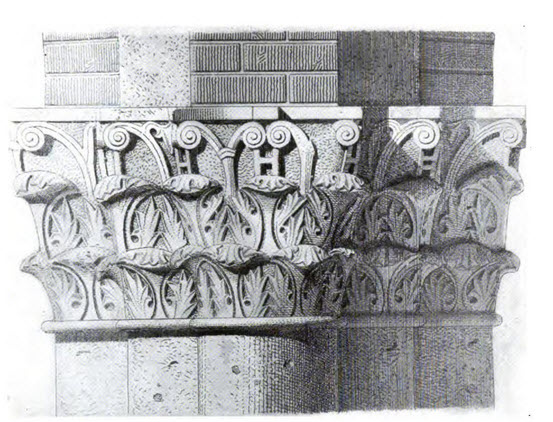
Heptameron Story 50
"O unhappy one, what words have I heard? to what decree of death have I hearkened? what final sentence have I received? O best beloved of men, is this the reward of my chaste, honourable and virtuous love? O my heart, hast thou made so parlous an election, and chosen for the most loyal the most faithless, for the truest the most false, for the discreetest the most slanderous? Alas! can it be that a thing hidden from every human eye has been revealed to the Duchess? Alas, my little dog, so well taught and the sole instrument of my love and virtuous affection, it was not you who betrayed me, it was he whose voice is louder than a dog's bark, and whose heart is more thankless than any brute's. Tis he who, contrary to his oath and promise, has made known the happy life which, wronging none, we so long have led together. O my beloved, the love of whom alone has entered into my heart, and preserved my life, must you now be declared my deadly foe, while mine honour is given to the winds, my body to the dust, and my soul to its everlasting abode? Is the beauty of the Duchess so exceeding great that, like the beauty of Circe, it has bewitched and transformed you? Has she turned you from virtue to vice, from goodness to wickedness, from being a man to be a beast of prey? O my beloved, though you have failed in your promise to me, yet will I keep mine to you, and, now that our love has been revealed, will never see you more. Nevertheless, I cannot live without your presence, and so I gladly yield to my exceeding sorrow, and will seek for it no cure either in reason or in medicine. Death alone shall end it, and death will be sweeter to me than life on earth without lover, honour or happiness. Neither war nor death has robbed me of my lover; no sin or fault of mine has robbed me of my honour; neither error nor demerit of mine has made me lose my joy. 'Tis cruel fate that has rendered the most favoured of men thankless, and has caused me to receive the contrary of that which I deserved.
"Ah, my Lady Duchess, what delight it was to you to taunt me with my little dog! Rejoice, then, in the happiness you owe to me alone; taunt her who thought by careful concealment and virtuous love to be free from any taunt. Ah! how those words have bruised my heart! how they have made me blush for shame and pale for jealousy! Alas, my heart, I feel that thou art indeed undone! The wicked love that has discovered me burns thee; jealousy of thee and evil intent towards thee are to thee as ice and death; while wrath and sorrow do not suffer me to comfort thee. Alas, poor soul, that in adoring the creature didst forget the Creator, thou must return into the hands of Him from whom vain love tore thee away. Have trust, my soul, that thou wilt find in Him a Father kinder than was the lover for whose sake thou hast so often forgotten Him. O my God, my Creator, Thou who art the true and perfect love, by whose grace the love I bore to my beloved has been stained by no blemish save that of too great an affection, I implore Thee in mercy to receive the soul-and spirit of one who repents that she has broken thy first and most just commandment. And, through the merits of Him whose love passeth all understanding, forgive the error into which excess of love has led me, for in Thee alone do I put my perfect trust. And farewell, O my beloved, whose empty name doth break my very heart."
With these words she fell backward, and her face grew pallid, her lips blue, and her extremities cold.
Just at this moment the gentleman she loved came into the hall, and, seeing the Duchess dancing with the ladies, looked everywhere for his sweetheart. Not finding her, he went into the chamber of the Duchess, and there found the Duke, who was walking up and down, and who, guessing his purpose, whispered in his ear—
"She went into that closet, and methought she was ill."
The gentleman asked whether he would be pleased to let him go in, and the Duke begged him to do so. When he entered the closet he found the Lady du Vergier, come to the last stage of her mortal life; whereat, throwing his arms about her, he said—
"What is this, sweetheart? Would you leave me?"
The poor lady, hearing the voice that she knew so well, recovered a little strength and opened her eyes to look upon him who was the cause of her death; but at this look her love and anguish waxed so great that, with a piteous sigh, she yielded up her soul to God.
The gentleman, more dead than the dead woman herself, asked the damsel who was there how this sickness had come upon his sweetheart, and she told him all the words that she had heard. Then the gentleman knew that the Duke had revealed the secret to his wife, and felt such frenzy that, whilst embracing his sweetheart's body, he for a long time watered it with his tears, saying—
"O traitorous, wicked and unhappy lover that I am! why has not the punishment of my treachery fallen upon me, and not upon her who is innocent? Why was I not struck by a bolt from heaven on the day when my tongue revealed the secret and virtuous love between us? Why did not the earth open to swallow up this traitor to his troth? O tongue, mayest thou be punished as was the tongue of the wicked rich man in hell!
"O heart, too fearful of death and banishment, mayest thou be torn continually by eagles as was the heart of Ixion! (3)
"Alas, sweetheart, the greatest of all the greatest woes has fallen upon me! I thought to keep you, but I have lost you; I thought to see you for a long time and to abide with you in sweet and honourable content, yet now I embrace your dead body, and you passed away in sore displeasure with me, with my heart and with my tongue. O most loyal and faithful of women, I do confess myself the most disloyal, fickle and faithless of all men. Gladly would I complain of the Duke in whose promise I trusted, hoping thus to continue our happy life; but alas! I should have known that none could keep our secret better than I kept it myself. The Duke had more reason in telling his secret to his wife than I in telling mine to him. I accuse none but myself of the greatest wickedness that was ever done between lovers. I ought to have submitted to be cast into the moat as he threatened to do with me; at least, sweetheart, you would then have lived in widowhood and I have died a glorious death in observing the law that true love enjoins. But through breaking it I am now in life, and you, through perfectness of love, are dead; for your pure, clear heart could not bear to know the wickedness of your lover.
"O my God! why didst Thou endow me with so light a love and so ignorant a heart? Why didst thou not create me as the little dog that faithfully served his mistress? Alas, my little friend, the joy your bark was wont to give me is turned to deadly sorrow, now that another than we twain has heard your voice. Yet, sweetheart, neither the love of the Duchess nor of any living woman turned me aside, though indeed that wicked one did often ask and entreat me. 'Twas by my ignorance, which thought to secure our love for ever, that I was overcome. Yet for that ignorance am I none the less guilty; for I revealed my sweetheart's secret and broke my promise to her, and for this cause alone do I see her lying dead before my eyes. Alas, sweetheart, death will to me be less cruel than to you, whose love has ended your innocent life. Methinks it would not deign to touch my faithless and miserable heart; for life with dishonour and the memory of that which I have lost through guilt would be harder to bear than ten thousand deaths. Alas, sweetheart, had any dared to slay you through mischance or malice, I should quickly have clapped hand to sword to avenge you; 'tis therefore right that I should not pardon the murderer who has caused your death by a more wicked act than any sword-thrust. Did I know a viler executioner than myself, I would entreat him to put your traitorous lover to death. O Love! I have offended thee from not having known how to love, and therefore thou wilt not succour me as thou didst succour her who kept all thy laws. 'Tis not right that I should die after so honourable a manner; but 'tis well that I should die by mine own hand. I have washed your face, sweet, with my tears, and with my tongue have craved your forgiveness; and now it only remains for my hand to make my body like unto yours, and send my soul whither yours will go, in the knowledge that a virtuous and honourable love can never end, whether in this world or in the next."
Rising up from the body he then, like a frenzied man beside himself, drew his dagger and with great violence stabbed himself to the heart. Then he again took his sweetheart in his arms, kissing her with such passion that it seemed as though he were seized rather with love than with death.
The damsel, seeing him deal himself the blow, ran to the door and called for help. The Duke, on hearing the outcry, suspected misfortune to those he loved, and was the first to enter the closet, where he beheld the piteous pair. He sought to separate them, and, if it were possible, to save the gentleman; but the latter clasped his sweetheart so fast that he could not be taken from her until he was dead. Nevertheless he heard the Duke speaking to him and saying—"Alas! what is the cause of this?" To which, with a glance of fury, he replied—"My tongue, my lord, and yours." So saying, he died, with his face close pressed to that of his mistress.
The Duke, wishing to know more of the matter, made the damsel tell him what she had seen and heard; and this she did at full length, sparing nothing. Then the Duke, finding that he was himself the cause of all this woe, threw himself upon the two dead lovers, and, with great lamentation and weeping, kissed both of them several times and asked their forgiveness. And after that he rose up in fury, and drew the dagger from the gentleman's body; and, just as a wild boar, wounded with a spear, rushes headlong against him that has dealt the blow, so did the Duke now seek out her who had wounded him to the bottom of his soul. He found her dancing in the hall, and more merry than was her wont at the thought of the excellent vengeance she had wreaked on the Lady du Vergier.
The Duke came upon her in the midst of the dance, and said—
"You took the secret upon your life, and upon your life shall fall the punishment."
So saying, he seized her by the head-dress and stabbed her with the dagger in the breast. All the company were astonished, and it was thought that the Duke was out of his mind; but, having thus worked his will, he brought all his retainers together in the hall and told them the virtuous and pitiful story of his niece, and the evil that his wife had wrought her. And those who were present wept whilst they listened.
Then the Duke ordered that his wife should be buried in an abbey which he founded partly to atone for the sin that he had committed in killing her; and he caused a beautiful tomb to be built, in which the bodies of his niece and the gentleman were laid together, with an epitaph setting forth their tragic story. And the Duke undertook an expedition against the Turks, in which God so favoured him, that he brought back both honour and profit. On his return, he found his eldest son now able to govern his possessions, and so left all to him, and went and became a monk in the abbey where his wife and the two lovers were buried. And there did he spend his old age happily with God.
"Such, ladies, is the story which you begged me to relate, and which, as I can see from your eyes, you have not heard without compassion. It seems to me that you should take example by it, and beware of placing your affections upon men; for, however honourable or virtuous these affections may be, in the end they have always an aftertaste of evil. You see how St. Paul would not that even married people should so deeply love each other; (4) for the more our hearts are set upon earthly things, the more remote are they from heavenly affection, and the harder is the tie to be broken. I therefore pray you, ladies, ask God for His Holy Spirit, who will so fire your hearts with the love of God, that when death comes, you will not be pained at leaving that which you love too well in this world."
"If their love," said Geburon, "was as honourable as you describe, why was it needful to keep it so secret?"
"Because," said Parlamente, "the wickedness of men is so great, that they can never believe deep love to be allied with honour, but judge men and women to be wicked according to their own passions. Hence, if a woman has a dear friend other than one of her nearest kinsfolk, she must speak with him in secret if she would speak long with him; for a woman's honour is attacked, whether she love virtuously or viciously, since people judge only from appearances."
"But," said Geburon, "when a secret of that kind is revealed, people think far worse of it."
"I grant you that," said Longarine; "and so it is best not to love at all."
"We appeal from that sentence," said Dagoucin, "for, did we believe the ladies to be without love, we would fain be ourselves without life. I speak of those who live but to win love: and, even if they secure it not, yet the hope of it sustains them and prompts them to do a thousand honourable deeds, until old age changes their fair sufferings to other pains. But, did we think that ladies were without love, it were needful we should turn traders instead of soldiers, and instead of winning fame, think only of hea'ping up riches."
"You would say, then," said Hircan, "that, were there no women, we should all be dastards, as though we had no courage save such as they put into us. But I am of quite the opposite opinion, and hold that nothing weakens a man's courage so much as to consort with women or love them too much. For this reason the Jews would not suffer a man to go to the war within a year after his marriage, lest love for his wife should draw him back from the dangers that he ought to seek." (5)
"I consider that law," said Saffredent, "to have been without reason, for nothing will more readily make a man leave his home than marriage. The war without is not harder of endurance than the war within; and I think that, to make men desirous of going into foreign lands instead of lingering by their hearths, it were only needful to marry them."
"It is true," said Ennasuite, "that marriage takes from them the care of their houses; for they trust in their wives, and for their own part think only of winning fame, feeling certain that their wives will give due heed to the profit."
"However that may be," replied Saffredent, "I am glad that you are of my opinion."
"But," said Parlamente, "you are not discussing what is chiefly to be considered, and that is why the gentleman, who was the cause of all the misfortune, did not as quickly die of grief as she who was innocent."
Nomerfide replied—
"'Twas because women love more truly than men."
"Nay," said Simontault, "'twas because the jealousy and spitefulness of women make them die without knowing the reason, whereas men are led by their prudence to inquire into the truth of the matter. When this has been learnt through their sound sense, they display their courage, as this gentleman did; for, as soon as he understood the reason of his sweetheart's misfortune, he showed how truly he loved her and did not spare his own life."
"Yet," said Ennasuite, "she died of true love, for her steadfast and loyal heart could not endure to be so deceived."
"It was her jealousy," said Simontault, "which would not yield to reason, so that she believed evil of her lover of which he was not guilty at all. Moreover, her death was matter of necessity, for she could not prevent it, whilst her lover's death was voluntary, after he had recognised his own wrongdoing."
"Still," said Nomerfide, "the love must needs be great that causes such deep sorrow."
"Have no fear of it," said Hircan, "for you will never die of that kind of fever."
"Nor," said Nomerfide, "will you ever kill yourself after recognising your error."
Here Parlamente, who suspected that the dispute was being carried on at her own expense, said, laughing—
"'Tis enough that two persons should have died of love, without two others fighting for the same cause. And there is the last bell sounding for vespers, which will have us gone whether you be willing or not."
By her advice the whole company then rose and went to hear vespers, not forgetting in their fervent prayers the souls of those true lovers, for whom, also, the monks, of their charity, said a De profundis. As long as supper lasted there was no talk save of the Lady du Vergier, and then, when they had spent a little time together, they withdrew to their several apartments, and so brought to an end the Seventh Day.
Footnotes:
- This story is borrowed from an old fabliau, known under the title of the Châtelaine de Vergy, which will be found in the Recueil de Barbazan (vol iv.) and in Legrand d'Aussy's Fabliaux (vol iii.). Margaret calls the lady Madame du Vergier (literally the lady of the orchard) in her tale. Bandello imitated the same fabliau in his Novelle (1554; part iv. nov. v.), but gave it a different ending. Belleforest subsequently adapted it for his Histoires Tragiques. Margaret's tale may also be compared with No. lxii. of the Cento Novelle antiche, p. 84 of the edition of Florence, 1825.—L. and M.
- At Argilly the Dukes of Burgundy had a castle, which was destroyed during the religious wars at the close of the sixteenth century. The place is now a small village in the arrondissement of Nuits, Côte d'Or. As the crow flies, it is some ten miles distant from the ruins of the castle of Vergy, which stands on a steep height, at an altitude of over 1600 ft., within five miles from Nuits. The castle, which can only be reached on one side of the hill, by a narrow, winding and precipitous pathway, is known to have been in existence already in the tenth century, when the Lords of Vergy were Counts of Chalons, Beaune, and Nuits. They appear to have engaged in a struggle for supremacy with the princes of the first Ducal house of Burgundy, but in 1193 Alix de Vergy espoused Duke Eudes III., to whom she brought, as dower, the greater part of the paternal inheritance. The castle of Vergy was dismantled by Henry IV., and the existing ruins are of small extent. Some antiquaries believe the fortress to have been originally built by the Romans.—B.J. and L.
- Queen Margaret's memory plainly failed her here.—Ed.
- I Corinthians vii. 32-5.—M.
- See Deuteronomy xx. 5, 6, 7; and the comments thereon of Rabelais (book iii. ch. vi.).—M.
Online Edition of the Heptameron
This is the Heptameron of Marguerite de Navarre
Other Sites: CruikshankArt.com · Dante's Inferno · Book-Lover.com · Canterbury Tales ·
This site is created by the Heptameron Information Society.

